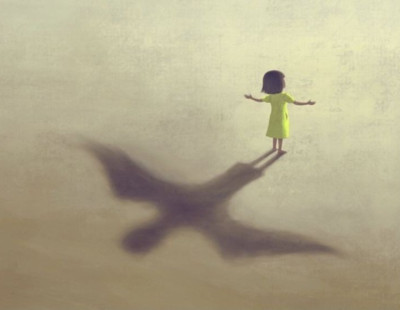If a man is to shed the light of the sun upon other men, he must first of all have it within himself. – Romain Rolland Because of a rare but serious illness, I had to stay home for nearly a year… In the half-dreaming, half-awake haze of my illness, I saw black and white architecture outlining a Chinese ink wash painting, rendered layer by layer. Loneliness and the fear of the future, at times hesitant, at times plaintive, but always restless inside of me, drove my mood into a deep trough. The days of recuperation in my hometown were more difficult to bear than the days in the hospital. Only my grandpa and his flute accompanied me throughout those miserable days. Every dawn, Grandpa sat near me, and the crisp sound of his flute woke me gradually from sleep like a silver bell. I rose slowly and pushed the wooden window open, letting the breeze of the wind gently stir his face. The leaves outside rustled in the wind, as if they were accompaniment for Grandpa's music. The golden line of the sun sprinkled through the morning fog, giving the cold body some warmth. Looking over, I saw that Grandpa's arms had opened like a soft, beautiful arc. His fingertips danced on the bamboo cylinder, and his lips nearly kissed the flute's opening. Instantly, the clear and robust notes sounded and filled every corner of the room. The melody expanded and collided with the surrounding eaves, rocks, flowers, and trees, reverberating and revealing its boldness. One day, I told Grandpa the confusion in my heart. “Shouldn't the music of the flute be melodious, soothing, and soft? Why can't I find the sweet tone in your music, instead of such a vigorous feeling?” Grandpa didn't answer. He just silently lifted the flute again, placed it on his lips. Breathed in, breathed out… The sun was already high. The sunlight pierced through the accumulated smog in the dawn like a sharp sword. I felt shrouded by a near holy light, from the deep soul of the inquiry. A gentle smile floated on the corner of Grandpa's mouth. He said quietly, “Beethoven once said that ‘music is the one incorporeal entrance into the higher world of knowledge which comprehends mankind but which mankind cannot comprehend.' Different people playing the flute will use it to give different interpretations of life.” Then Grandpa shrugged; although he was in his 70s, he showed that the vicissitudes left by the erosion of time couldn't stop the breath of life in him. He said to me, “Grandpa wants you to know, how can there be no hardships in one's life? Plain sailing is just a wish. We must carry our load honorably before fate's final curtain.” Then, I remembered stories told and read about my grandpa. Back in the days of the cultural revolution, when he was in his twenties, he endured, bore, and withstood pain. He had attended Tsinghua University. Then, because the area was invaded by Japan, three schools (Peking University, Tsinghua University, and Nankai University) moved to Yunnan and became a combined school called Xi'an Union University. When Grandpa arrived, there was absolutely nothing of use. The students started constructing and building the classrooms themselves. For food, they were self-sufficient, and ate the food they grew. After finishing school, he joined the army, fought in campaigns, and participated in reform movements. Wars, turmoil, upheavals, crusades, disasters, revolutions, reformations… He had completely undergone that era. He suffered from but weathered the misery, tribulation and distress. If he hadn't, there wouldn't be my father and me, nor the peaceful dwellings for my family and the work sufficient to sustain us. He experienced the unrest and left us with the most glorious homeland. And how did he stand the agony? Just by the way he reacted to life. He always had rays of sunlight inside himself, and was willing to shed the light on others. I felt in my soul a deep stirring toward life. Maybe I could be more optimistic about my life and my future. Maybe the sound of Grandpa's flute had opened my mind and my heart. I thought back to the story of Beethoven, one of my heroes. In 1827, as the storm and lightning accompanied each other, Beethoven, at death's door, raised his dry arms and waved to the sky as a final struggle. The moment his life ended, it had an ultimate meaning: he didn't just wait for the Reaper's scythe to fall; he showed that the battle goes on as long as the heart is beating. In that moment of my reverie, the image of Beethoven's arm hitting the keyboard of the piano suddenly coincided with the sound of Grandpa's flute, and I realized that if you go through enough oceans and seas, you will never be afraid of streams and rivers. Grandpa's flute inspired me to keep going. To cease to struggle means you cease to live. Even when occasionally challenged by fate, keep in mind that the rays of the morning sun can break through the darkness; remember to say to Fate, “So what?”

_124_auto.png)





